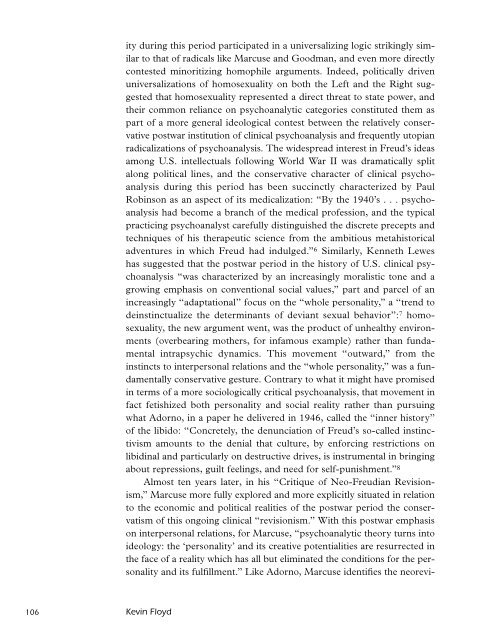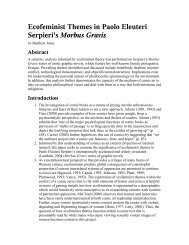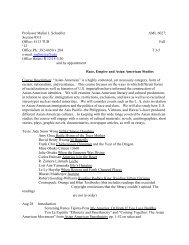Rethinking Reification: Marcuse, Psychoanalysis, and Gay Liberation
Rethinking Reification: Marcuse, Psychoanalysis, and Gay Liberation
Rethinking Reification: Marcuse, Psychoanalysis, and Gay Liberation
You also want an ePaper? Increase the reach of your titles
YUMPU automatically turns print PDFs into web optimized ePapers that Google loves.
106 Kevin Floyd<br />
ity during this period participated in a universalizing logic strikingly similar<br />
to that of radicals like <strong>Marcuse</strong> <strong>and</strong> Goodman, <strong>and</strong> even more directly<br />
contested minoritizing homophile arguments. Indeed, politically driven<br />
universalizations of homosexuality on both the Left <strong>and</strong> the Right suggested<br />
that homosexuality represented a direct threat to state power, <strong>and</strong><br />
their common reliance on psychoanalytic categories constituted them as<br />
part of a more general ideological contest between the relatively conservative<br />
postwar institution of clinical psychoanalysis <strong>and</strong> frequently utopian<br />
radicalizations of psychoanalysis. The widespread interest in Freud’s ideas<br />
among U.S. intellectuals following World War II was dramatically split<br />
along political lines, <strong>and</strong> the conservative character of clinical psychoanalysis<br />
during this period has been succinctly characterized by Paul<br />
Robinson as an aspect of its medicalization: “By the 1940’s . . . psychoanalysis<br />
had become a branch of the medical profession, <strong>and</strong> the typical<br />
practicing psychoanalyst carefully distinguished the discrete precepts <strong>and</strong><br />
techniques of his therapeutic science from the ambitious metahistorical<br />
adventures in which Freud had indulged.” 6 Similarly, Kenneth Lewes<br />
has suggested that the postwar period in the history of U.S. clinical psychoanalysis<br />
“was characterized by an increasingly moralistic tone <strong>and</strong> a<br />
growing emphasis on conventional social values,” part <strong>and</strong> parcel of an<br />
increasingly “adaptational” focus on the “whole personality,” a “trend to<br />
deinstinctualize the determinants of deviant sexual behavior”: 7 homosexuality,<br />
the new argument went, was the product of unhealthy environments<br />
(overbearing mothers, for infamous example) rather than fundamental<br />
intrapsychic dynamics. This movement “outward,” from the<br />
instincts to interpersonal relations <strong>and</strong> the “whole personality,” was a fundamentally<br />
conservative gesture. Contrary to what it might have promised<br />
in terms of a more sociologically critical psychoanalysis, that movement in<br />
fact fetishized both personality <strong>and</strong> social reality rather than pursuing<br />
what Adorno, in a paper he delivered in 1946, called the “inner history”<br />
of the libido: “Concretely, the denunciation of Freud’s so-called instinctivism<br />
amounts to the denial that culture, by enforcing restrictions on<br />
libidinal <strong>and</strong> particularly on destructive drives, is instrumental in bringing<br />
about repressions, guilt feelings, <strong>and</strong> need for self-punishment.” 8<br />
Almost ten years later, in his “Critique of Neo-Freudian Revisionism,”<br />
<strong>Marcuse</strong> more fully explored <strong>and</strong> more explicitly situated in relation<br />
to the economic <strong>and</strong> political realities of the postwar period the conservatism<br />
of this ongoing clinical “revisionism.” With this postwar emphasis<br />
on interpersonal relations, for <strong>Marcuse</strong>, “psychoanalytic theory turns into<br />
ideology: the ‘personality’ <strong>and</strong> its creative potentialities are resurrected in<br />
the face of a reality which has all but eliminated the conditions for the personality<br />
<strong>and</strong> its fulfillment.” Like Adorno, <strong>Marcuse</strong> identifies the neorevi-




